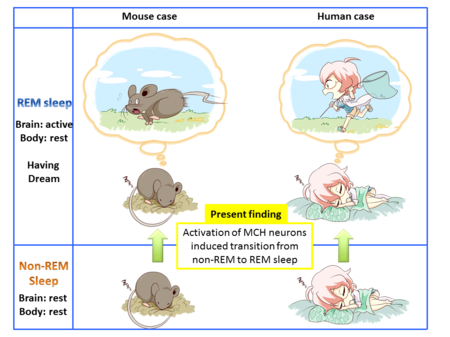 Professor Akihiro Yamanaka at the Research Institute of Environmental Medicine, Nagoya University, and his co-researchers have elucidated the role of neurons that alternate REM and non-REM sleep. They have succeeded in artificially triggering REM sleep. Their paper was published online in The Journal of Neuroscience on May 14, 2014. Their research has attracted widespread attention in many fields as it deepens the understanding of underlying mechanisms of instinctive behaviors (including sleep) that have not been previously unraveled.
Professor Akihiro Yamanaka at the Research Institute of Environmental Medicine, Nagoya University, and his co-researchers have elucidated the role of neurons that alternate REM and non-REM sleep. They have succeeded in artificially triggering REM sleep. Their paper was published online in The Journal of Neuroscience on May 14, 2014. Their research has attracted widespread attention in many fields as it deepens the understanding of underlying mechanisms of instinctive behaviors (including sleep) that have not been previously unraveled.
There are two stages of sleep: REM and non-REM sleep. The brain activity is high, but the body rests in the REM stage, whereas both rest in the non-REM stage. Non-REM sleep always precedes REM sleep, and they switch in some stages. Research studies on sleep, particularly REM sleep, have had little progress because the mechanisms underlying the alternation were not understood previously, and it was difficult to identify the sleep stages.
Prof. Yamanaka's research group focused on neurons that generate the melanin-concentrating hormone (MCH), which is believed to enhance appetite. They created three mice: one with MCH neurons activated by light exposure, one with neurons that are inhibited by light exposure, and the third with MCH neurons that are destroyed at desired timing. As a result, REM sleep increased three-fold in the first mouse, sleep showed little change in the second, and sleep time was reduced in the third mouse. Therefore, it was elucidated that MCH neurons are important in sleep, regulating both REM and non-REM sleep. MCH neurons are located in the hypothalamic area where many neurons that accommodate instinctive behaviors are inhibited, and instinctive desires such as appetite, sex, and sleep drive are intricately related to these neurons. Prof. Yamanaka's research is widely expected to contribute to solving many issues such as treatments for drug addiction and psychiatric illness and memory consolidation by explaining the underlying mechanisms of instinctive behaviors.
Professor Akihiro Yamanaka
Professor Akihiro Yamanaka has researched the neural organization that is involved in instinctive behaviors, such as the desire for food and sleep. He researched circulatory organs including the heart until he attained his PhD. Since researchers at his laboratory discovered the neuropeptide orexin, he has started his research of neurons that directly influence our behaviors. Using optogenetic approaches in his hypothalamus research, he has contributed to the solutions of difficult issues in our lives such as eating disorders, mental disorders, and drug addiction.
Outlook for the Future
"How and which neurons operate in the brains of conscious and active animals and how their activity is involved in behavioral manifestations have not been explained. Optogenetics can regulate the activity of targeted neurons with light. Using this approach, I would like to provide an answer to the mystery behind neurons that control instinctive behaviors that are essential for existence and species preservation."
Message to Young Students
 "Can the brain understand the brain? This is the question that is posed to the brains of brain scientists. I hope your brain finds the question interesting and you will join our research challenge for elucidating brain mechanisms. I will be waiting for you."
"Can the brain understand the brain? This is the question that is posed to the brains of brain scientists. I hope your brain finds the question interesting and you will join our research challenge for elucidating brain mechanisms. I will be waiting for you."
Links
Research Information
Nagoya University Press Release (Japanese)
The Journal of Neuroscience
Professor Akihiro Yamanaka Information
Nagoya University Faculty Member Profile
Professor Yamanaka Laboratory